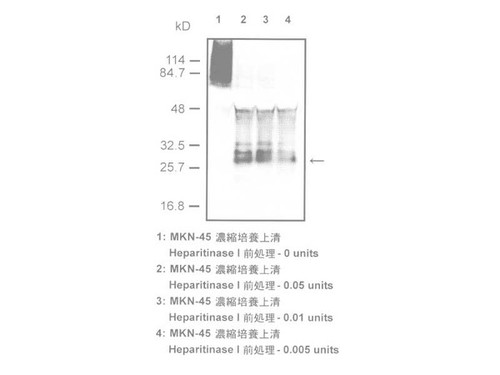Syndecan, a cell surface proteoglycan, is an integral membrane protein acting as a receptor for the extracellular matrix. The syndecan family of four transmembrane heparan sulfate proteoglycans binds a variety of soluble and insoluble extracellular effectors. Syndecan extracellular domains (ectodomains) can be shed intact by proteolytic cleavage of their core proteins, yielding soluble proteoglycans that retain the binding properties of their cell surface precursors. The syndecan-4 acts in conjunction with the α5β1 integrin to promote the formation of actin stress fibers and focal adhesions in fibronectin-adherent cells. For research use only, not for use in diagnostic procedures.
- application:
- IHC, WB
- Catalog number:
- 18751
- Datasheet:
- formulation:
- Lyophilized product from 1% BSA in PBS containing 0.05% NaN3
- immunogen:
- Maltose Binding Protein (MBP) - Syndecan-4 recombinant protein
- MSDS:
- notes:
- For research use only, not for use in diagnostic procedures.
The datasheet for this product (see above) is intended to serve as an example only. Please refer to the datasheet provided with the antibody for precise details. - Other names:
- Please see datasheet
- Protocol:
- purification:
- Purified with Recombinant Syndecan-4
- size:
- 100 µg
- specificity:
- Confirmed by western blotting
- storage:
- Lyophilized product, 5 years at 2 - 8 °C, Solution, 2 years at 20 °C
- Species:
- Human
- Host:
- Rabbit
- References:









